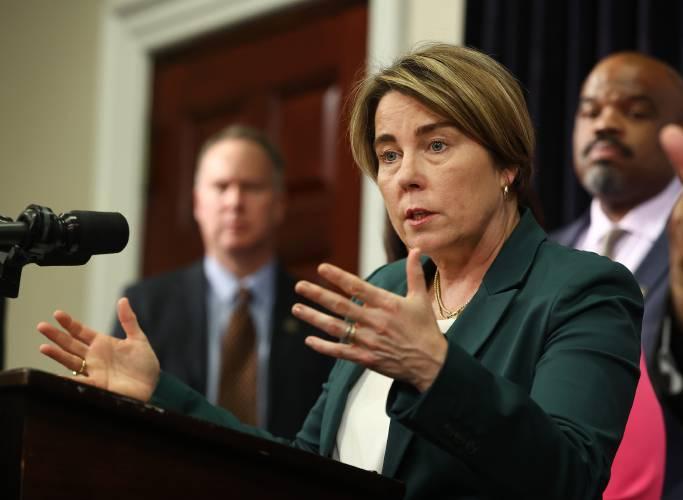Massachusetts has recently enacted a significant infrastructure bill aimed at revitalizing the state’s transportation networks, public facilities, and community development projects. As the Commonwealth embarks on this ambitious plan, local communities stand to experience a variety of impacts ranging from improved roadways and bridges to enhanced public transit options. This article explores what the new Massachusetts Infrastructure Bill means for residents,businesses,and municipal governments across the state,highlighting the potential benefits and challenges at the local level.
Table of Contents
- Massachusetts Infrastructure Bill Targets Local Transportation Upgrades
- Funding Allocations and Their Impact on Community Development
- Addressing Environmental Concerns Through Sustainable Infrastructure
- Recommendations for Maximizing Benefits to Local Residents and Businesses
- In Summary
Massachusetts Infrastructure Bill Targets Local Transportation Upgrades
The recently passed infrastructure bill allocates significant funding to boost local transportation networks across Massachusetts. Communities can expect targeted investments that focus on modernizing critical roads, bridges, and public transit systems. Emphasis will be placed on enhancing safety standards, reducing congestion, and improving connectivity between urban centers and suburban areas. This strategic approach aims to not only address current transportation challenges but also to future-proof networks for increased demand and technological advancements.
Key local transportation upgrades include:
- Rehabilitation of aging bridges to ensure compliance with modern safety codes
- Expansion of bus rapid transit corridors to provide more efficient service
- Installation of smart traffic signals to improve traffic flow and reduce emissions
- Enhanced pedestrian and bicycle infrastructure promoting sustainable travel options
- Integration of electric vehicle charging stations across public parking facilities
Funding Allocations and Their Impact on Community Development
Significant portions of the Massachusetts Infrastructure Bill are earmarked for revitalizing local communities, targeting essential sectors such as transportation, public facilities, and green spaces. The infusion of capital aims to address long-standing infrastructure gaps, catalyzing economic growth and improving quality of life for residents.Key investment areas include:
- Upgrading transit systems to reduce commute times and enhance accessibility.
- Rehabilitating public buildings, including schools and community centers, promoting safer and more modern environments.
- Expanding parks and recreational facilities to foster healthier, more connected neighborhoods.
These targeted allocations not only generate immediate construction jobs but also create long-term opportunities for local businesses and workforce development. The bill’s strategic funding is poised to bridge infrastructural inequities, particularly in underserved areas, aligning with the state’s broader goals of sustainability and inclusive growth. Ultimately, this approach promises to transform community landscapes and reinforce economic resilience across Massachusetts.
Addressing Environmental Concerns Through Sustainable Infrastructure
Massachusetts is taking significant strides towards integrating sustainability into the core of its infrastructure projects. The new infrastructure bill prioritizes the reduction of carbon emissions by investing heavily in green technologies and eco-kind materials. This includes upgrading transportation networks with electric vehicle charging stations and expanding renewable energy sources across public facilities. Additionally, the legislation emphasizes water conservation through improved stormwater management systems designed to protect local ecosystems and reduce urban flooding risks.
Key initiatives introduced in the bill include:
- Development of climate-resilient roads and bridges that withstand extreme weather conditions.
- Increased funding for public transit systems to decrease reliance on fossil fuels.
- Support for community-led projects focusing on local environmental restoration and green spaces.
These efforts collectively aim to create a durable infrastructure framework that not only supports economic growth but also upholds environmental stewardship,ensuring healthier and more sustainable communities throughout the state.
Recommendations for Maximizing Benefits to Local Residents and Businesses
To truly harness the potential of the infrastructure bill, local stakeholders should prioritize transparent community engagement and targeted investments that reflect the unique needs of their neighborhoods. Ensuring accessible forums for residents to voice concerns and suggestions will foster a sense of ownership and accountability. Equally significant is the collaboration between municipal governments and local businesses to tailor infrastructure projects that stimulate economic growth, such as improving transit routes that directly connect commercial hubs with residential areas or upgrading broadband access for small enterprises.
Maximizing local benefits also requires a strategic approach to workforce development and sustainability. Initiatives that focus on hiring and training local workers,particularly in sectors impacted by infrastructure improvements,will create lasting economic opportunities. Additionally, integrating sustainable materials and green technologies into projects not only aligns with Massachusetts’ environmental goals but incentivizes innovation among local suppliers and contractors. Recommendations for success include:
- Offering incentives for local procurement to boost small business participation
- Developing public-private partnerships to expand resources and expertise
- Launching educational programs tied to infrastructure sectors in collaboration with community colleges
In Summary
As Massachusetts embarks on this ambitious infrastructure journey, the true measure of success will be seen in local communities-where improved roads, bridges, and public transit can enhance daily life and economic opportunity. Residents and businesses alike stand to benefit from the bill’s investments, which aim not only to modernize the state’s core systems but also to build resilience for the future. As implementation unfolds, close attention to how funds are allocated and projects prioritized will be essential to ensure that the promise of this legislation is fully realized across every corner of Massachusetts. For continued updates and detailed facts on state programs and initiatives, visit Mass.gov [[1]](https://www.mass.gov/massachusetts-state-organizations).

